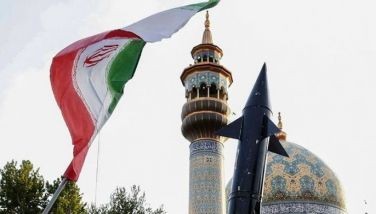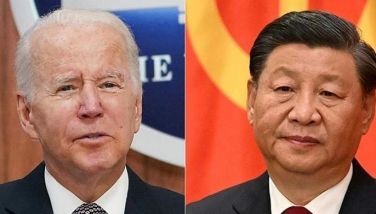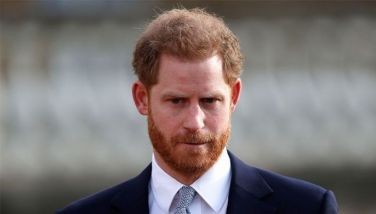Good or bad Iran nuke deal? Israel vs. the US administration
VIENNA — The US and Iran are inching toward a nuclear deal that's not as good as Israeli Prime Minister Benjamin Netanyahu wants — but not as bad as he says it is shaping up to be.
Israel says any pact short of totally dismantling Iranian programs with weapons-making potential is deeply flawed. Netanyahu's planned speech to the US Congress March 3 — just a few weeks before the target date for a general agreement — gives him a high-profile soapbox to make his case.
Washington's approach is to degrade Iran's programs in order to extend the time Iran would need to make a nuclear weapon from the present few months to at least a year. US officials say that would give the international community enough reaction time to do what it takes to stop Tehran.
Ahead of the next round of negotiations this week, a look at any potential agreement and how effective it may be.
___
GOOD DEAL OR BAD DEAL?
Relying on an inspection regime seems dicey considering the history of nations the world over — including Israel itself — acquiring nuclear weapons through deceit. And an Iranian nuclear weapon would further tilt the already unstable Middle Eastern strategic equation.
"It is one thing to try and verify that they are not bypassing you and it is another to verify that there is nothing to verify," Israeli Intelligence Minister Yuval Steinitz told The Associated Press.
But defenders of such a deal say that such an evasion would be very difficult. Daryl Kimball of the Washington-based Arms Control Association says tough monitoring would result in "enough time to detect and disrupt" any Iranian effort to work on a bomb.
In any case, the option of pressing Iran toward total dismantling seems unrealistic. In a world where the US has no stomach for another Middle Eastern military involvement, and Russia and China are unlikely to join a total embargo on the Iranian economy, proponents of the possible deal see it as the least bad option.
___
WHAT'S THE MAIN DISPUTE AND WHO'S AHEAD?
With only a few weeks left until the March deadline, Iran — which insists it does not want nuclear arms — seems to be ahead in pushing the other side to compromise.
The main dispute is over the size and potency of Iran's uranium enrichment program, which can make both reactor fuel and the fissile core of a weapon. The US, along with Russia, China, Britain, France and Germany, came to the table demanding that Tehran dismantle 80 to 90 percent of the nearly 10,000 centrifuges now turning out enriched uranium along with all of the 8,000 or so other machines set up but not working.
But faced with Iranian resistance, diplomats now say the US is prepared to accept 4,500 operating centrifuges — perhaps more — if Tehran agrees to constraints on their efficiency.
Washington has also compromised on initial demands that constraints on Iran's nuclear program last 20 years or more. Diplomats say it is now ready to accept 10 to 12 years.
___
CAN THE DEADLOCK BE SKIRTED?
Diplomats familiar with the talks say the US may be prepared to accept higher centrifuge numbers if their potential to enrich uranium is reduced.
One idea being discussed with Iran would limit the size of its stockpiles of uranium gas, which is fed into centrifuges for enrichment. The amount of gas Tehran would be allowed to store would depend on the number centrifuges Iran keeps.
Second, Iran could commit to shipping out most of the enriched uranium it produces leaving it without enough to make a bomb.
A third possibility is reconfiguring the setup of the centrifuges. The machines are set up in series, called cascades, to spin uranium gas to increasingly higher concentrations of enriched uranium, and reconfiguring the cascades can significantly reduce the amount of enriched uranium produced at their tail end.
___
WILL A DEAL LEAVE IRAN ON THE NUCLEAR WEAPONS THESHOLD?
The US administration continues to insist that it will not accept any deal that does not extend the time Iran could make a nuclear bomb to at least a year.
Kimball, of the Arms Control Association, says that there is no alternative to the US approach. Hopes that Iran will substantially bend on centrifuge numbers after more than a decade of resistance are "a dangerous illusion," he says.
Olli Heinonen, a former head of the Iran file at the UN nuclear agency, says the mix could work, but only if Iran agrees to run no more than 2,000 to 4,000 centrifuges — something Tehran says it will not accept.
"The killer is the number of centrifuges," says Heinonen.
David Albright of the Institute for Science and Security in Washington notes that — even if such a deal is sealed — it becomes difficult to monitor because of all the moving parts.
"The more elements you add, the more Iran can break individually," he says.
And he says that even destroying all of Iran's centrifuges, as Israel demands, would probably leave Tehran in a position to rebuild enough to make a bomb within two years in a "crash program" applying decades of expertise.
- Latest
- Trending



























